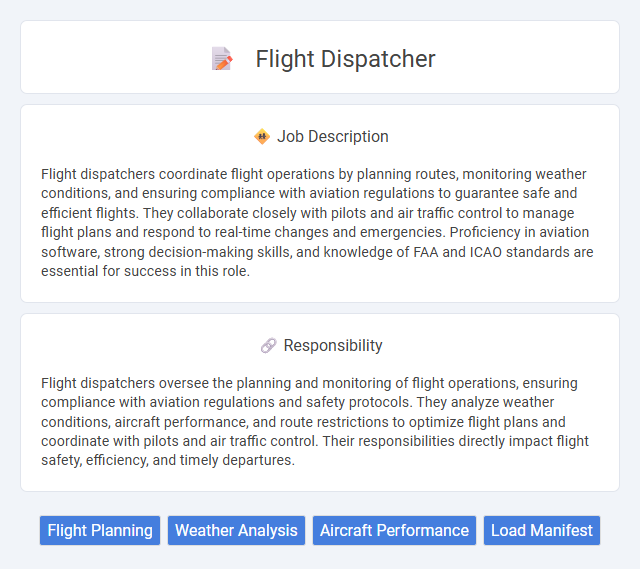
Flight dispatchers coordinate flight operations by planning routes, monitoring weather conditions, and ensuring compliance with aviation regulations to guarantee safe and efficient flights. They collaborate closely with pilots and air traffic control to manage flight plans and respond to real-time changes and emergencies. Proficiency in aviation software, strong decision-making skills, and knowledge of FAA and ICAO standards are essential for success in this role.
Individuals with strong analytical skills and the ability to remain calm under pressure are likely suitable for a flight dispatcher role. Those who thrive in fast-paced, detail-oriented environments and possess excellent communication abilities may find themselves well-matched to the demands of this job. People who struggle with multitasking or high-stress decision-making might face challenges in meeting the responsibilities of flight dispatching.
Qualification
Flight dispatchers must hold certification from national aviation authorities such as the FAA in the United States or EASA in Europe, requiring completion of specialized training programs and passing rigorous exams. Strong knowledge of meteorology, air navigation, and federal aviation regulations is essential to ensure safe and efficient flight planning. Experience with flight planning software and excellent decision-making skills under pressure dramatically enhance a dispatcher's qualifications.
Responsibility
Flight dispatchers oversee the planning and monitoring of flight operations, ensuring compliance with aviation regulations and safety protocols. They analyze weather conditions, aircraft performance, and route restrictions to optimize flight plans and coordinate with pilots and air traffic control. Their responsibilities directly impact flight safety, efficiency, and timely departures.
Benefit
Flight dispatcher jobs likely offer competitive salaries and attractive benefits, including health insurance and retirement plans. The role may provide opportunities for career advancement and skill development in the aviation industry. Workers could also experience job stability and the satisfaction of contributing to flight safety and operational efficiency.
Challenge
Flight dispatcher roles likely involve significant challenges due to the critical nature of coordinating complex flight operations and ensuring safety. They may frequently encounter unpredictable weather changes and last-minute adjustments, requiring quick decision-making under pressure. The probability of high-stress situations is considerable, as their decisions can directly impact flight schedules and passenger safety.
Career Advancement
Flight dispatchers play a critical role in aviation safety by planning and monitoring flights, managing weather conditions, and coordinating with pilots and air traffic control. Career advancement opportunities include specialization in areas such as meteorology, airline operations management, or transitioning to roles like airline safety officer or aviation consultant. Gaining certifications from organizations such as the FAA and acquiring experience in larger airlines can significantly enhance career growth prospects.
Key Terms
Flight Planning
Flight dispatchers play a critical role in flight planning by analyzing weather conditions, air traffic, and aircraft performance to develop safe and efficient flight routes. They calculate fuel requirements, monitor regulatory compliance, and coordinate with pilots to adjust plans in response to dynamic factors. Their expertise ensures optimal operational efficiency while maintaining safety standards in commercial aviation.
Weather Analysis
Flight dispatchers play a critical role in aviation safety by conducting detailed weather analysis to ensure optimal flight routes and timing. They utilize advanced meteorological data, including satellite imagery, radar information, and weather forecasts, to anticipate hazardous conditions such as turbulence, storms, and icing. Accurate weather assessment enables flight dispatchers to coordinate with pilots and air traffic control, minimizing delays and enhancing overall operational efficiency.
Aircraft Performance
Flight dispatchers play a crucial role in ensuring aircraft performance meets safety and efficiency standards by analyzing various operational factors such as weight, balance, fuel requirements, and weather conditions. They collaborate with pilots and ground crews to optimize flight plans, considering aircraft capabilities like takeoff distance, climb rate, and payload limits. Accurate assessment of aircraft performance parameters minimizes risks and supports regulatory compliance for safe and economical flight operations.
Load Manifest
Flight dispatchers play a critical role in preparing the load manifest, which details the weight and balance of cargo, passengers, and fuel onboard an aircraft. Accurate load manifests ensure compliance with safety regulations and optimal aircraft performance by preventing overloading and maintaining proper weight distribution. Flight dispatchers collaborate closely with pilots and ground crews to verify load data before departure, enhancing flight safety and operational efficiency.
 kuljobs.com
kuljobs.com